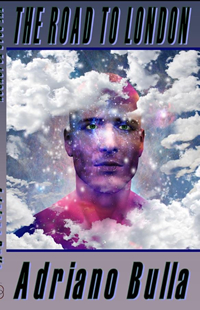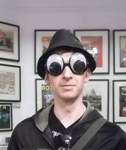REVIEW: Adriano Bulla: "The Road to London"
 (Novel)
(Novel)
- ISBN-13: 9781909224896
- 128 pages
- More info about the book
Yes, I will. Yes. I will save the world, the universe and you.’ So starts a journey which I had never expected and which filled me with... beauty.
Yes, beautiful is the first word that comes to mind when reading The Road to London: impressively so, originally so and idiosyncratically so. The beauty of this novel has left me speechless for days before I could start writing about it. The beauty of the style and sentences, the beauty of the story, the beauty of the psychological complexity of the main character, the beauty of the emotions, the beauty of the imagery and symbolism and the beauty of the novel’s structure all come together as if the words had been dictated directly by the muse.
The words in this story sound so genuine and yet so perfectly chosen for their effect and rhythm; from powerful lines, such as:
‘Thunder strikes; the grey city shakes. Scolding the grey metropolis, thunder strikes, low, remote like a lost lament. Thunder strikes; the fierce wind sweeps the long grey avenues that lead nowhere, scraping the walls, chasing the smog into the ground. Thunder strikes; the land cowers.’ Page 118, to witticisms like ‘So I knew for the first time what love is. It’s when someone beats you at your own game,’ (Page 8) through the sheer beauty of similes that lead the mind far, far away into a world of light and colour, this book’s beauty never ceases to amaze, for example:
‘High in the heavens the stars have spoken. The eternal choir of spheres meeting spheres to brush, depart, then meet again, like blossoms sparkling in the desert to worship the Sun through drops of rain and for an instant sing their colours to the light...’ (Page 139)
The story seems simple, but like all things in this novel, what seems is not what really is: the ‘physical plot’ is that of a boy who can’t come to terms with his real identity, sexuality and a hostile world. But it’s what goes on in the feelings and emotions of this boy (nameless, to add an element of mystery or universality, which actually makes it easier to identify with him) that creates a whole parallel world, a dimension of the heart, in the boy’s mind and in the reader’s imagination. The reader gets lost along possible paths, some leading nowhere, some suggesting solutions like in a huge puzzle of reality, dreams, present, future, past, hallucinations, mistake, lies, people and relationships. And isn’t this what our experience of life is: a puzzle?
The style reminds me of Virginia Woolf mixed with Emily Bronte, but has a real touch and flavour of its own; it also offers passages that remind us of Dickens, no longer the Inimitable, a few snappy aphorisms a la Wilde, that suddenly appear to make sense, there are intricacies in the structure one would expect from Ian McEwan, but made easy and readable for the reader, but the amazing thing is that it works wonderfully well.
Having chosen a contradictory character to lead the story, born an alpha male when it comes to mind and social relationships, but submissive, fetishist and in need of being controlled in his sexual life makes the dynamics between psychology and sexuality a sparkling pleasure to explore. Even there, this novel finds beauty where most people would think there is none: beauty in suffering, beauty in hardship, beauty in a kinky sexuality, beauty in trying as much as in failing. It is as if wherever this novel directs its spotlight, beauty starts shining, even in the most remote places of the mind, of life and of the heart.
The images of colours, light, the sea, waves, the sun, the moon, fire and a grey metropolis fill this novel like a painting full of hues and shapes, each symbolic. The symbols start slowly, and the novel starts simply, if mysteriously, then builds layers of meanings that suddenly come together at the end. End? Bit ‘her’ (yes, the book is a she!) own statement, this romance does not actually end, instead, it leaves the reader to ‘give her life with [the reader’s] own imagination,’ (Page 124), then regales us with a chapter, called ‘The Breath of Light’ which is totally otherworldly: the scene moves to another dimension, maybe in the future, maybe in a parallel universe, dreams and fantasy have now become the reality of the story, a final, wonderful episode about the only character with a full name, Seb White, is introduced like an arrow into the reader’s heart, death becomes the solution but it also becomes also life, the narrator changes, to even the second person then, without the reader realising, it closes with an omniscient third person with what must be one of the most exquisite endings (bit not end) of any book. I will not, of course, spoil it for you, but be prepared.
The themes are dealt with with great honesty and real passion: we have talked about identity and sexuality, but there are so many, from friendship to love, from injustice and bullying to coming out and HIV, from drugs and alcohol to music and clubbing, this book concentrates so much in so few pages without overdoing any of the themes and being such a pleasant read throughout that the artistry of the author seems to hide in the background: it all sounds and looks so natural that it seems no toil has gone into writing it, but in reality, it is a very complex text with such mastery of writing, the very mastery that is so perfectly honed that it seems effortless. This book does not draw attention to itself, to its technical perfection, but the reader, in a generous drive to serve the reader rather than itself; this is what I find the most, forgive me the word, beautiful feature of this novel.
The Road to London offers so much to the adolescent in the pangs of angst, to the gay person as well as to straight readers, it offers so much to those who read for the pleasure of it as well as to the bookworm like me, it offers so much to younger and older readers, those who are still experimenting with life and those who are looking at it with the drive of philosophical inquisition, it makes the peculiar universal, the ‘unacceptable’ or taboo amiable; it has, for me, all the qualities of a classic.
 Reviewed by:
Reviewed by:
William Barrett